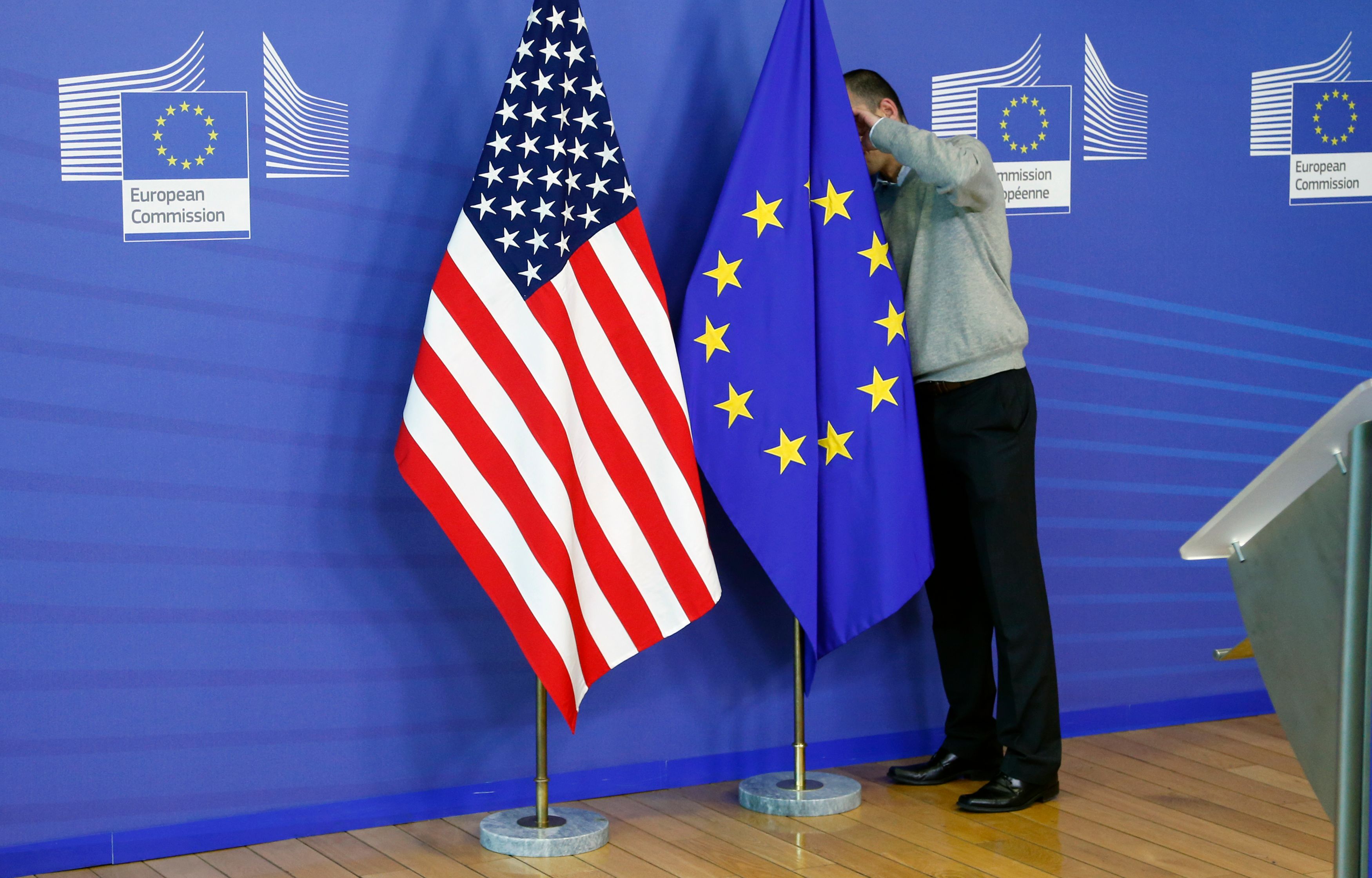Prospects for Deeper Economic Relations between the EU and the U.S.

Clashes between the U.S. and the EU have been rife during Donald Trump’s term in office. The president has tried to reduce the U.S. trade deficit by imposing tariffs on some European goods. The U.S. withdrawal from the Paris Agreement on climate was a disappointment for EU leaders. Joe Biden’s election is perceived in Europe as an opportunity to improve relations. On 2 December 2020, the European Commission (EC) published a communication containing several ideas to solve the trade disagreements, as well as common efforts against climate change and coordinated actions in the digital sector.
Trade
Biden criticises Trump’s protectionist strategy. The EU can therefore assume that the incoming president is ready to withdraw the tariffs imposed by his predecessor, especially given that Trump’s measures have not changed trade relations in America’s favour (the EU’s surplus in 2019 was larger by a third than in 2016). The new president will, however, strive to ensure easier access to the EU market for U.S. goods, agricultural products in particular. Improving export opportunities for U.S. companies features prominently on his political agenda. Yet, the chances for a return to a wide-ranging trade agreement are slim. The EU Trade Commissioner, Valdis Dombrovskis, reminded in November that opposition to such a deal remains strong on both sides, and suggested negotiating sectoral agreements.
Apart from bilateral issues, both the American and European relations with China will be the centre of attention. The EU and U.S. pursue similar efforts to achieve reciprocity in economic relations with their Asian partner and to eliminate negative features such as forced technology transfers or the attempted takeovers of innovative firms by state-supported Chinese companies. Biden stated that he would seek to establish a common position towards China with major U.S. allies. The EU has declared readiness to coordinate actions with the Americans, but on 30 December the EC concluded negotiations for an investment agreement with China.
Climate Policy
The appointment of former Secretary of State John Kerry, who negotiated the Paris Agreement, to the position of special envoy for climate indicates the president-elect’s readiness to increase activity in this area. Currently, 73 % of Americans see climate change as an important social challenge. Biden announced a climate summit aimed at encouraging countries that generate significant greenhouse gas (GHG) emissions to reduce them quickly. He also declared that the U.S. will strive to reach carbon neutrality by 2050. Biden will focus special attention on the renewable energy sector, especially on investments in solar and wind technology. One goal is to produce 100% of electric energy without CO2 emissions by 2035 (currently, about 38%). However, transforming these obligations into legislative acts will be difficult if the Republicans maintain a majority in the Senate. Republicans are generally more sceptical about increasing regulations, for example, on mining companies. Biden may instead count on Republican support for a border carbon tax, which he proposed during his campaign. This tax would be in the form of duties on products imported from countries with lower emission standards.
A U.S. return to the Paris Agreement is important for the EU, which endeavours to mobilise the largest countries to reduce emissions. The U.S. generates almost twice as much GHGs than the EU, and without its participation it will be difficult to achieve the accord’s goals. Moreover, greater U.S. involvement will help the EC persuade Member States to implement the EU’s ambitious climate policy goals, including implementing a border carbon tax. This mechanism will not only protect EU companies from competing with countries lacking similar ecological norms but also in financing the pandemic recovery fund.
Tech Market
The EU is counting on working with the new U.S. administration on issues concerning the tech market. On 15 December 2020, the EC presented two complex legal projects that form a set of rules for functioning in this area. They will have considerable impact on American companies, the so-called tech giants—Amazon, Apple, Facebook, and Google—which dominate the sector. The EU’s goals include protecting competition and ensuring that the largest companies do not abuse their strong positions and impede smaller entities from entering the market. The proposed changes would obligate tech platforms to remove infringing content more effectively. The EU also seeks to impose a digital tax that would hit the American companies. EU leaders hope that Biden will engage in negotiations through the OECD to work out an international understanding on this issue. The tech giants’ tax avoidance continues to not only hurt their image in the EU but also that of the U.S.
In the U.S., concerns about the tech giants similar to those expressed by many European politicians are rising, especially among some members of the Democratic Party, who note the strong position of some companies on online markets. Court rulings on antitrust lawsuits concerning Facebook and Google as well as pressure from progressive Democrats can force the Biden administration to begin future work on regulations in this area. However, this issue is currently not a priority. Tech giants like Amazon and Facebook supported the Biden election campaign by donating up to $4.7 million. Biden has suggested increasing the taxes on profits made by American companies abroad but, unlike the EU plans, in a way that directs the proceeds to the U.S. budget rather than to those countries where the profits are generated. Democrats are more open than Republicans to the proposals formulated by the EC on adopting common data protection and artificial intelligence standards. However, they are concerned that such regulations may limit tech innovation. Democrats also share the Trump administration’s scepticism of U.S. allies developing deeper cooperation with China on 5G technology.
Conclusions and Perspectives
By engaging to improve relations with the U.S., the EU seeks to not only end the threat of a trade war but also to simplify the achievement of such key aims as quickening the reduction of GHG emissions and elaborating tech market standards while also creating new sources of revenue. Biden is more willing than his predecessor to treat the EU as a partner in the rivalry with China. However, the EU’s conclusion of an investment agreement with China just before the inauguration of the new administration may abate this readiness. American-European rapprochement would constitute the basis for a broader understanding among democratic states to counter unfavourable Chinese initiatives. The growing American trade deficit will be a challenge that Biden, although declaring an aversion to trade wars, will try to eradicate. In talks concerning the tech sector, despite obvious areas of cooperation like cybersecurity, the U.S. may fear that EU regulations stem not only from concern for fair competition but also from efforts to support European companies.
The Biden administration may be ambivalent towards EU plans aimed at strengthening economic strategic autonomy. An increase in EU self-sufficiency and strengthening mechanisms to protect the European market will be beneficial for the U.S. so long as they constitute a barrier to China’s growing influence. However, some EU plans, especially those aimed at gaining technological sovereignty, open the field for potential conflicts with the U.S. The development of economic relations will also be affected by the progress of discussions concerning political cooperation on such issues as the future of NATO or support for multilateralism.
For Poland, an improvement in transatlantic economic relations would not only secure the interests of companies directly or indirectly exporting goods to the U.S. but also open new opportunities for cooperation, for example, in the atomic and renewable energy sectors.



